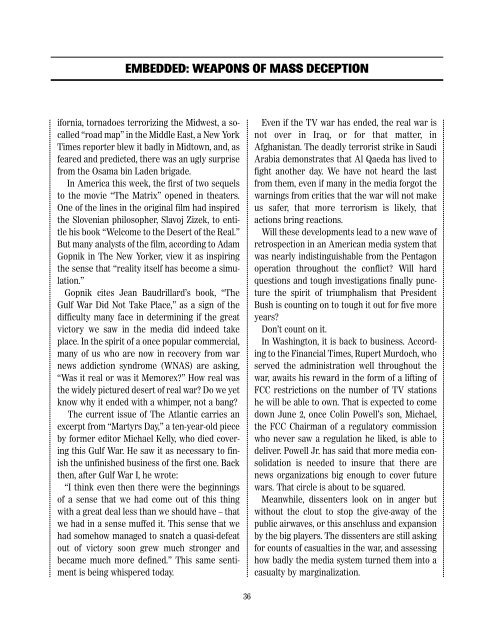UPDATED - ColdType
UPDATED - ColdType
UPDATED - ColdType
- TAGS
- updated
- coldtype
- coldtype.net
You also want an ePaper? Increase the reach of your titles
YUMPU automatically turns print PDFs into web optimized ePapers that Google loves.
EMBEDDED: WEAPONS OF MASS DECEPTION<br />
ifornia, tornadoes terrorizing the Midwest, a socalled<br />
“road map” in the Middle East, a New York<br />
Times reporter blew it badly in Midtown, and, as<br />
feared and predicted, there was an ugly surprise<br />
from the Osama bin Laden brigade.<br />
In America this week, the first of two sequels<br />
to the movie “The Matrix” opened in theaters.<br />
One of the lines in the original film had inspired<br />
the Slovenian philosopher, Slavoj Zizek, to entitle<br />
his book “Welcome to the Desert of the Real.”<br />
But many analysts of the film, according to Adam<br />
Gopnik in The New Yorker, view it as inspiring<br />
the sense that “reality itself has become a simulation.”<br />
Gopnik cites Jean Baudrillard’s book, “The<br />
Gulf War Did Not Take Place,” as a sign of the<br />
difficulty many face in determining if the great<br />
victory we saw in the media did indeed take<br />
place. In the spirit of a once popular commercial,<br />
many of us who are now in recovery from war<br />
news addiction syndrome (WNAS) are asking,<br />
“Was it real or was it Memorex?” How real was<br />
the widely pictured desert of real war? Do we yet<br />
know why it ended with a whimper, not a bang?<br />
The current issue of The Atlantic carries an<br />
excerpt from “Martyrs Day,” a ten-year-old piece<br />
by former editor Michael Kelly, who died covering<br />
this Gulf War. He saw it as necessary to finish<br />
the unfinished business of the first one. Back<br />
then, after Gulf War I, he wrote:<br />
“I think even then there were the beginnings<br />
of a sense that we had come out of this thing<br />
with a great deal less than we should have – that<br />
we had in a sense muffed it. This sense that we<br />
had somehow managed to snatch a quasi-defeat<br />
out of victory soon grew much stronger and<br />
became much more defined.” This same sentiment<br />
is being whispered today.<br />
36<br />
Even if the TV war has ended, the real war is<br />
not over in Iraq, or for that matter, in<br />
Afghanistan. The deadly terrorist strike in Saudi<br />
Arabia demonstrates that Al Qaeda has lived to<br />
fight another day. We have not heard the last<br />
from them, even if many in the media forgot the<br />
warnings from critics that the war will not make<br />
us safer, that more terrorism is likely, that<br />
actions bring reactions.<br />
Will these developments lead to a new wave of<br />
retrospection in an American media system that<br />
was nearly indistinguishable from the Pentagon<br />
operation throughout the conflict? Will hard<br />
questions and tough investigations finally puncture<br />
the spirit of triumphalism that President<br />
Bush is counting on to tough it out for five more<br />
years?<br />
Don’t count on it.<br />
In Washington, it is back to business. According<br />
to the Financial Times, Rupert Murdoch, who<br />
served the administration well throughout the<br />
war, awaits his reward in the form of a lifting of<br />
FCC restrictions on the number of TV stations<br />
he will be able to own. That is expected to come<br />
down June 2, once Colin Powell’s son, Michael,<br />
the FCC Chairman of a regulatory commission<br />
who never saw a regulation he liked, is able to<br />
deliver. Powell Jr. has said that more media consolidation<br />
is needed to insure that there are<br />
news organizations big enough to cover future<br />
wars. That circle is about to be squared.<br />
Meanwhile, dissenters look on in anger but<br />
without the clout to stop the give-away of the<br />
public airwaves, or this anschluss and expansion<br />
by the big players. The dissenters are still asking<br />
for counts of casualties in the war, and assessing<br />
how badly the media system turned them into a<br />
casualty by marginalization.

















